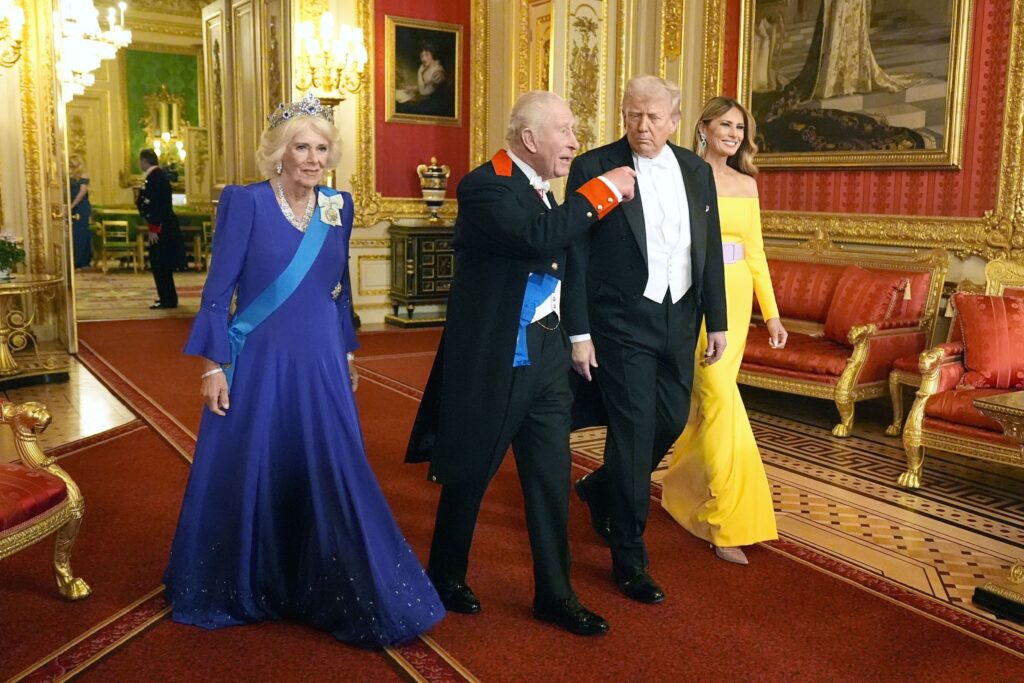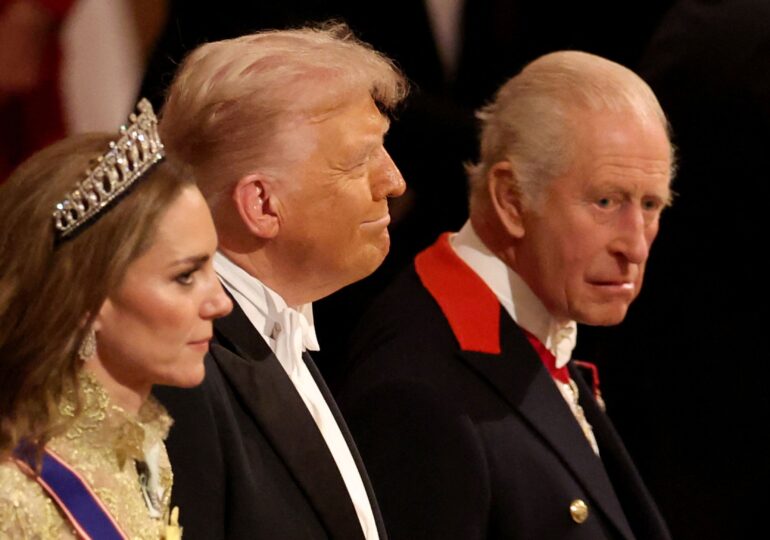The United Kingdom offered President Donald Trump a welcome fit for the king that, often, he likes to believe he is.
It was a day shrouded in gold – from Queen Victoria’s carriage, which carried the president to Windsor Castle, to the soldiers in fur-trimmed coats and the splendor on the state banquet table – more than Trump has managed to gather at Mar-a-Lago and in the Oval Office.
The reality show star turned president adores splendor and being in the spotlight. And the royal family perhaps offered him more splendor than he has ever seen. Drummers and guards in bear fur coats paraded in his honor, and at a formal dinner, he dined between a king (Charles III) and a future queen (Catherine, Princess of Wales), in the grandest property in the royal portfolio, as described by CNN from the scene at Windsor.
"This is truly one of the greatest honors of my life," Trump said in response to the king's toast.
Among all the praises with which other nations have overwhelmed Trump, this could be the most flattering.
The ancient art of the British monarchy
The British monarchy has been practicing the "art of negotiation" long before Trump was born. Her Majesty's government desires protection against the president's unpredictable instincts, more favorable trade tariffs, investments for a slow-growing economy, and funds for a new artificial intelligence center. And hopes to persuade Trump not to abandon Ukraine into the hands of his friend Vladimir Putin.
However, Trump's royal reception was also an unsettling fairy tale. The way nations choose to present themselves on such occasions can reflect vulnerabilities.
The rituals in Trump's honor belong to a vanished empire. He wants to make America "great again." Britain was once great, but today it depends deeply on the United States for defense and economic well-being. It may organize military parades on the lawns at Windsor, but it would face major difficulties in sending a viable force to Europe if Russia were to invade. In the 21st century, it sells the glory of the 19th century.
But never has an American president been so receptive to royal flattery.

A reversed history
With an ironic smile, Charles recalled George Washington's oath never to set foot on British soil again. Over two centuries ago, John Adams, a Founding Father and future president, wrote to his family about his disgust at bowing before the king against whom he had led a revolution.
Trump would not recognize such restraint or self-awareness. Yet, the current sovereign did not seem ironic when he said, "I cannot help but wonder what our ancestors from 1776 would have thought about this friendship today."
Trump's comfort in the royal court was proof that the American head of state resembles more the monarchs of yore, indifferent and all-powerful, than George Washington, who understood that the greatest responsibility of power is knowing when to relinquish it.
Diplomacy is often unpleasant. But Trump's second state visit to the UK once again showed that much of the world has decided that the only way to tame his authoritarian behavior is to stroke his vanity.
A challenging political test
Beyond the images, Trump's visit posed a serious challenge for British Prime Minister Keir Starmer, who scored a huge electoral victory last year but quickly plunged into a political crisis.
Starmer was praised for how he managed the relationship with Trump. The UK escaped with a 10% tariff on its exports to the US - lower than the one imposed by the European Union, which Trump despises.
Starmer also plays a central role in the "Coalition of Will" that wants to provide security guarantees to Ukraine after a peace agreement, but which needs Trump's support. He has also promised to increase defense spending, as per American requirements, although no one knows how he will finance that.
But the prime minister, already unpopular, is playing a risky game. Many Britons see Trump as a "corrupt interloper" and consider his values contradict the principles of the West.
Yet, even if he is hated, his populist politics are gaining ground in the UK. The anti-immigration Reform Party, led by his friend Nigel Farage, is leading in polls and could shatter the historical dominance of the Conservatives and Labour in the next elections.
Controversies and shadows
The Trump administration seems to constantly meddle in British politics. Vice President JD Vance relaxed in the picturesque Cotswolds region but strongly criticized the UK for restrictions on freedom of expression. Trump's team is pressuring London to change limitations on extremist or racist online content to please American tech giants.
Over the weekend, his former ally Elon Musk intervened via video call at a far-right rally in London and called for "a revolution."
The situation became even more complicated when Starmer had to dismiss the British ambassador to Washington, Peter Mandelson, who organized the visit, due to his past friendship with Jeffrey Epstein.
The scandal drew attention to the fact that Trump himself has failed to completely sever ties with Epstein. Even the royal family is not immune: Prince Andrew was stripped of his official duties also due to connections with the convicted sex offender.
On Tuesday evening, protesters projected images of Trump and Epstein on the walls of Windsor Castle, echoing the views of many Britons who believe Trump should not have been invited at all.
The antipathy also explains why Windsor - originally built as a fortress - was chosen as the resting place for the president.
London Mayor Sadiq Khan, a long-time critic of Trump, wrote in The Guardian that instead of flattery, the UK should speak the truth to power: "President Donald Trump and his entourage have perhaps done the most to fuel far-right divisive politics around the world in recent years."
A memory of the past
Public disgust for Trump contrasts with the reserved reception of his rival Barack Obama, welcomed in 2011 by Queen Elizabeth II.
However, Trump is not the first American president greeted with protests. Ronald Reagan arrived in the UK in 1982 for a state visit amid concerns that his aggressive rhetoric could provoke a war with the USSR. Reagan was the first president to sleep at Windsor Castle, and the queen eased the visit with a horseback ride alongside him, an image that became famous.
At that time, left-wing Labour MP Tony Benn noted impressions that might sound familiar to Trump's critics today: "Reagan is just a movie star playing the role of a king, and the queen is like an actress in a film about Britain. Lady Thatcher is an extreme nationalist in Victorian style. I find it embarrassing to live in Britain now."
The political skill of the monarchy
The sensitivities of Trump's visit required a delicate diplomatic touch. King Charles has long been viewed with pity and irony in the UK, waiting to ascend the throne at over 70 years old. Many of his private opinions, like the need to combat climate change, clash with those of his guest. But the British monarchy is obliged by constitutional convention to be officially neutral.
Since ascending the throne, Charles has demonstrated fine political skills surpassing those of his mother, known for her public neutrality.
To soothe post-Brexit anxieties, he spoke fluent German in Berlin and French in Paris. And when the King of England sat next to Trump at the official tribune at Windsor, it was hard not to remember that, as the King of Canada, he had visited Ottawa in May to reaffirm the country's sovereignty, after repeated requests by the American president for it to become the 51st state.
Charles's political dexterity has been honed over decades. His first contacts with American presidents took place in 1959 when he helped his mother, Queen Elizabeth II, welcome Dwight Eisenhower at Balmoral Castle in Scotland.
For an institution as concerned with image as the House of Windsor, it is almost certain that the photograph of the young heir, in a kilt, was included to convey a signal of future continuity in the relationship with the US and to suggest the diplomacy he himself practiced on Wednesday.
Enter Winston Churchill
Trump traded the splendor of Windsor Castle on Thursday for the sobriety of Chequers, the official country residence of British prime ministers, in Buckinghamshire, northwest of London. The tireless historical propaganda machinery of the British state has its last chance to shine.
Trump was to be taken to archives related to Prime Minister Winston Churchill, a historical figure he reveres. At the state banquet, the president made sure to mention that the bust of the great leader from World War II - which the British press treats as a barometer of the "special relationship" across different American administrations - has been returned to the Oval Office.
The emphasis on Churchill - whose legend has become both a symbol of British identity and a mourning for lost power - is significant.
The then-prime minister, discouraged by the military defeats in the early months of the war, dined on a chilly December evening in 1941 at Chequers, alongside American Ambassador John Gilbert Winant and Franklin Roosevelt's special envoy, Averell Harriman.
As the clock struck 9:00, Churchill turned on the radio to listen to the news on the BBC and caught the end of a report stating that Japan had bombed American ships in Hawaii. A few moments later, a butler hurried in to confirm the news about Pearl Harbor, the attack that would draw the United States into the war.
Churchill, who knew that only American involvement could defeat the Nazis and Imperial Japan, wrote in his post-war memoirs that on that night, he "slept the sleep of the saved and grateful."
He recounted that he had never believed those who predicted that political division, recurring elections, reluctance to engage in foreign wars, and the tendency to remain "a vague shadow on the horizon, for friends or enemies" would mean that the Americans - "a distant, wealthy, and talkative people" - would never come to the aid of the old world. His description of pre-war American isolationism strikingly resembles a synthesis of Trump's "America First" policies.
The "special relationship" has often been taken more seriously in London than in Washington. However, after King Charles declared on Wednesday that "tyranny threatens Europe once again," all eyes are on Trump to see if he truly believes his statement that the term "special" is not enough to describe the bilateral relationship.
Britain hopes that Trump will return home sharing the sentiments expressed by Roosevelt to Churchill in a distorted sound telephone conversation on the night after Pearl Harbor:
"We are all in the same boat now."

